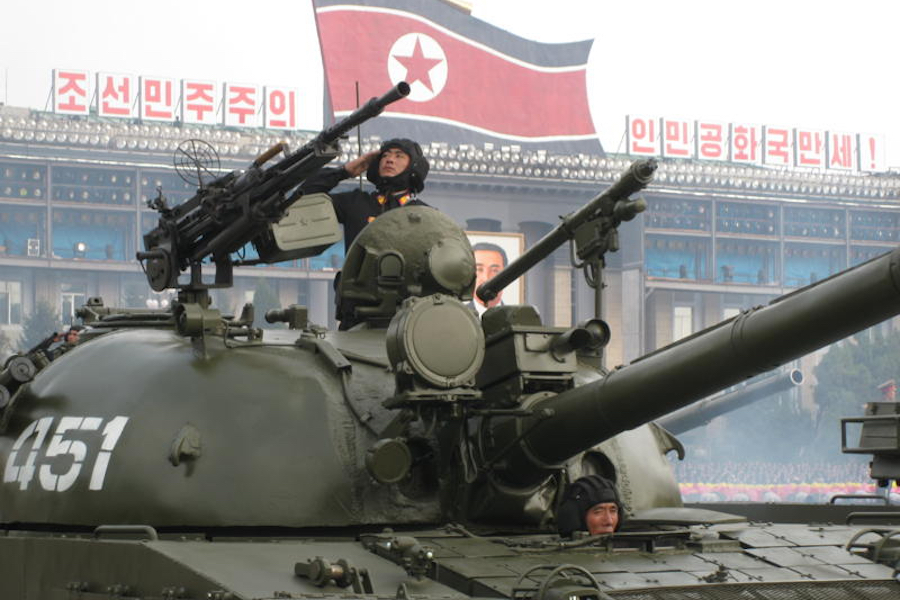
Japan’s New Security Reality in East Asia
Nearly all members of the Six Party Talks, except for Japan, seem to be on board to restart negotiations. Tokyo has been noticeably reticent amidst a bustle of preliminary meetings between the U.S. and North Korea and between Russia and South Korea. Even Beijing made a uncharacteristic push for Pyongyang to improve ties with the U.S. during Chinese Vice Premier Li Keqiang’s visit to the isolated state.
Though Japan would never officially remove itself from probably one of East Asia’s major multilateral forums, Tokyo’s less than enthusiastic response may indicate a change in its security concerns, both in regards to North Korea and other regional neighbors. With a pacifist constitution, many in Tokyo are growing increasingly uncomfortable with what they see as an imbalance in defense capabilities in East Asia, particularly with the growing military presence of Russia and China.
The epicenter of these major geopolitical shifts is China’s rapid economic growth. The country’s sudden economic rise has come with an increase in its military expenditure, rivaling second to that of the U.S. In addition to economic growth, Beijing has been more assertive in its foreign policies, especially on issues of territorial disputes with neighboring countries.
Russia, also concerned about China’s rise has made efforts to increase its military presence in its far east regions. In October, Prime Minister and presidential candidate, Vladimir Putin, called for a 3-percent GDP increase in defense spending, making the case that it would improve Russia’s aging military.
The proposal is an enormous spending boost, so much so that even former Minister of Finance Alexei Kudrin publicly opposed, a move that had contributed to his dismissal. And so, Japan finds itself nestled between two armed giants, and its worries for its own security are not entirely unsubstantiated. Considering Tokyo’s tumultuous history over territorial disputes with these two neighbors, a military armed conflict with China or Russia is not far from possible.
Caught Between China and Russia
Last September, tensions over the contested Senkaku islands reached a full flow when a Chinese trawler crashed into Japanese patrol boats near the disputed waters. Since then, the issue has raised for China and Japan nationalist sentiment at home and military maneuverings abroad. In October, Japan admitted to scrambling its planes over the islands when two Chinese jets came close to Japanese air space, using the moment as proof of Beijing’s growing aggressiveness. From the other side, Beijing has accused Japan of increasing the number of surveillance jets to the Chinese coasts by 44 percent from last year.
These exchanges such as these have led to a major announcement by Japan’s Air Self-Defense Force concerning a complete revamping of its air force and a multi-billion dollar purchase of new fighter jets. In addition to military posturing, Japan’s Prime Minister Yoshihiko Noda has not been shy about openly expressing his concerns about China’s nontransparent militarization. “With the provocative actions of North Korea, and the rapid growth of China’s military, along with its increased activity in nearby waters, the security situation around our country is becoming murkier…We must ask you to tighten the strings on your samurai helmets,” said Prime Minister Noda.
To the north, Tokyo also shares a long history of territorial disputes with Russia. In September, two strategic Russian bombers flew around Japan, sparking a string of diplomatic accusations. Japanese Foreign Minister Koichiro Genba called on Russia to “refrain from taking provocative action.” Meanwhile, Russia accused Tokyo of stirring controversy over what they considered a lawful training flight. These incidence exacerbated the already high strung tension over the contested Kuril islands, which have prevented both nations from signing a post-WWII peace treaty.
Conflict over the string of islands intensified earlier this year when President Medvedev increased military deployments to the territories, arming them with a Buk-M1 anti-air system and a battalion of T-80 tanks. According to the Russian Foreign Minister Sergei Lavrov, more sophisticated anti-air systems are to be installed on these islands as a part of the larger effort of military modernization. In addition to rearming the Kuril islands, Moscow has also stepped up its military exercises in the region. This past September, the Russian Pacific Fleet navigated through the Soya strait, north of Japan, to conduct military exercises. In the same month, Moscow also held cruise-missile exercises on the Kamchatka peninsula, just north of the Kuril islands.
Preparing for a New East Asia
With a rapidly changing East Asia, Japan is preparing itself for what it sees as a new security reality. One solution has been to rally with other allies that are uneasy with a militarized China and Russia, making any confrontation with the two a multilateral confrontation. One obvious partner is the United States, whose military presence in both South Korea and Japan serve as key pillars of the U.S.-Japan and U.S.-South Korea alliance.
Despite domestic calls for Washington to make military spending cuts, U.S. Defense Secretary Leon Panetta has reassured Tokyo of America’s commitment to Japanese defense.
South Korea has also become an unlikely military partner for Japan. Last December, South Korean observers were invited to a U.S.-Japan military exercise. Since then, the heads of both ministries of defense have met to create better systems of military supply and intelligence exchange. Later this week, South Korea’s and Japan’s Vice Ministers of Defense will hold bilateral talks on further increasing military cooperation. In addition to military cooperation, Tokyo has also been looking to expand diplomatic partnerships.
In an interview with the Financial Times, Prime Minister Noda called for greater cooperation among Asian countries to check China’s growing aggressive foreign policies over territorial disputes. “[We will] appeal in all kinds of meetings for China to abide by the rules…The important thing is to create an environment where China will make a positive contribution to peace and stability in the Asia-Pacific region,” said Prime Minister Noda.
While in the past, North Korea’s underground nuclear tests and missile launches over the islands have served as endless fodder for Japanese security concerns, China and Russia’s growing military boldness may soon prove to be a greater threat for Tokyo.

